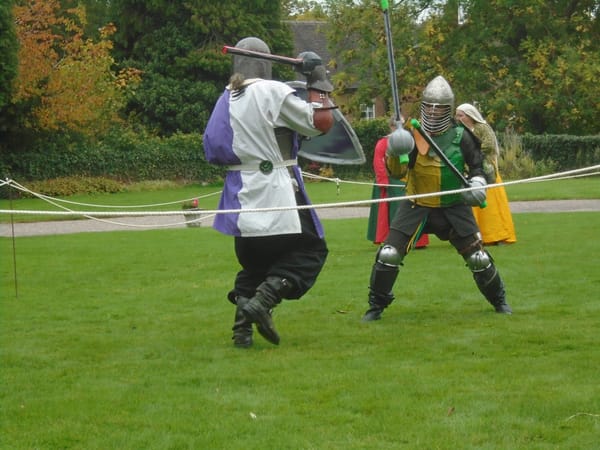Fun with words

I've been writing quite a bit recently, though I had to pause during the shingles as typing for any length of time was just too painful. In fact, I've been doing various forms of creative writing for most of my life, on and off, and my mother did not quite manage to kill that off when I was a child. What happened was that, when I was about eight years old, she had a conversation with one of my teachers. I'd been getting straight As for everything, which was what I was supposed to do, but nonetheless my mother managed to convince both herself and this teacher that I actually wasn't really that good at creative writing and he shouldn't really have given me an A for it, so something obviously had to be done to fix that. This meant that I was forced to work at home on a truly dreadful book called Towards Planned Composition, which was designed to replace the way I actually write with the way some random person thought everyone ought to write.
The moment I finished that book, I went straight back to writing the way I write. Even at that age, I knew very well that the stuff in the book might work for some people, but it didn't work at all for me. I continued to get high marks for creative writing all the rest of the way through school, but that was fine, because no doubt my mother thought I was still following the stupid book because she'd foisted it on me, so she was happy.
Consequently, please don't take anything in this post as an infallible recipe for producing a good story. It's entirely there for interest; I thought you might enjoy knowing how I, personally, produce a good story, but it may or may not work if you try it. It's even quite possible that you'll do better if you follow the procedures outlined in Towards Planned Composition; after all, they presumably worked all right for the author.
I start with two things: the main characters, and something that happens to one or more of them. That, in itself, is not a plot, and it's why I quite often have story ideas kicking around in the back of my skull for a long time. At the moment I have one sitting on the back burner which is set in the 1920s; it's about a flapper girl who is packed off for an extended stay with her aunt in the country because she's unfortunately pregnant. I know what the girl is like, I know what the aunt is like, I know the baby will be adopted by its mother's childless elder brother and his wife... but at the moment there is just this situation and I don't know exactly where it's going to go.
For a longer story such as the one sampled in the feature photo, that doesn't matter too much. This long story started with a character called Cyprian, who is the narrator; it's called The Bard's Tale, because Cyprian is a countertenor who plays D&D, and (like me) he's almost always the bard. (Side note: bards are great. They're exceptionally versatile, and helping the rest of the party is baked into the character set-up. This is why I love playing them; it's not just my fondness for the lute!) The basic idea was that Cyprian would end up lodging with his voice coach, and, from that position, witness a particular series of events. As it happened, that series of events totally changed as I was writing. The character Nigel Popejoy, who has just been introduced in this excerpt (he lives next door to Edward and Grace, who are the voice coach and his wife, and he has been helping Cyprian to move in), suddenly went from being quite a minor character to a very major one... because I realised that he and his wife had their own story which was much more significant than the one I had initially planned.
I have two things to say about Nigel Popejoy. One is that this is fine. Longer stories are much more forgiving than short ones. You can completely change horses in midstream, as I've done here, and get away with it. The other one is that his surname is no accident. This story is set in a fictionalised Wiltshire; I don't think Wiltshire is ever specifically mentioned, though I think I did drop in a passing reference to one of my fictional rivers joining the Avon at some point. And if you have a specific setting in mind... well, you know, we have the Internet these days, so there is no excuse not to research local surnames. Obviously many surnames, especially the really common ones like Smith or Brown, turn up everywhere; but if you're setting a story in Wiltshire, you need to make sure you have, for instance, Razeys and Liddiards and Popejoys and Gumms and Burrys (and for that matter Danielses, though I keep that name strictly out of fiction because I happen to know someone with it).
Generally, however, the shorter the story you're planning, the more clearly you need to know where it's going. You don't need to know every step of the way there (or you might, depending on how you like to write; but I find I don't). So, for instance, recently I wrote a short story about a woman who used to be a school bully who receives help from someone online, and it turns out to be the girl she primarily victimised at school. The crucial point was that the victim knew exactly who the bully was from the start, but not the other way. And this was always going to be a story about forgiveness, reconciliation, and change, so I knew I was writing towards that end. Exactly how it got to that end didn't become clear till I was writing it, but it did get there very effectively.
Another important thing about my writing is that it is very much character-driven. You can insert circumstances that are beyond the characters' control and have them react to those, but what you can't do is make someone act out of character. So if you need a character to do something they would normally not do, you're going to have to give them an overwhelming reason to do it. My all-time favourite example of this is a piece of Blake's 7 fanfic I wrote probably more than twenty years ago now. Avon, in that series, is a fascinating character (very much a tragic Shakespearean anti-hero, but he also gets all the best lines!); but one of the things about him is he's very rigid. Once he's decided to do something, he will not back down. And in this story I had to get him to back down. The story, sadly, went down with my hard drive, so I can't remember now why I needed him to back down or how I eventually did it; but I do recall that I rewrote that section four times before I was finally satisfied. I'd say, in fact, that there's really only one rule when you're writing a story, and that is this: once a character is established, whether by you or (if you're writing fanfic) by someone else, do not break that character. Once you do that, they're no longer the person they were; at the very best you have an inconsistent story, and at the worst - again, if you're writing fanfic - you're going to annoy an awful lot of people because they know what the character you're writing about is like. You want a character to do that thing that character X won't do? Get character Y to do it. At least, unless you can come up with a really extraordinary set of circumstances, as I had to do with Avon.
Generally speaking, I find it works to let the characters do as much of the driving as possible. So, in the long story, I had to move Cyprian from sharing a house with his friend "Falstaff" in a fictionalised version of Bath to lodging with Edward and Grace in a small village a short distance north of an equally fictionalised Salisbury. That was fine. I'd already established Falstaff as bright, occasionally impulsive, but with a strong sense of responsibility. So all I had to do was equip Falstaff with a girlfriend and let his character do the rest. Due to his impulsive side, he gets the girlfriend pregnant; due to the sense of responsibility, he doesn't let her down. In fact, he wants to move her in and is gearing up to have a very awkward conversation with Cyprian about that. Cyprian, however, has already anticipated him and decides to move out as soon as possible; he doesn't want to be an awkward third party. The whole transfer works smoothly and naturally, for no other reason but that Falstaff is who he is. (For the curious, his real name is John Foljambe; but his nickname does describe him rather neatly in many ways.)
The thing that completely failed about Towards Planned Composition for me was that it expected you to start with the plot. This clearly worked for Arthur C Clarke, since many of his stories have a killer plot but the characters are not especially well developed; but I am not that kind of writer. Indeed, essentially the same plot can look quite different with a different set of characters. And, in any case, for me, stories are primarily about people. Not necessarily always "people" in the ordinarily understood sense of "human beings"; they might be animals, or fantasy races, or even robots. But, whatever they are, they all have individual strengths, weaknesses, motivations, and quirks, and all of these affect exactly how the plot works. One of my best science fiction stories, The Eggs of 113, is about a political prisoner in a dystopian society. Uldar, the prisoner, is gentle, imaginative, and humorous; and it is precisely these qualities that make the story so powerful. It would have been a very different, and I think much less effective, story if I had written it about a fiery rebel.
So there you have it. My next one is going to be about a terrible old woman who spends all her time complaining about her neighbours. I won't tell you how it's going to end!




